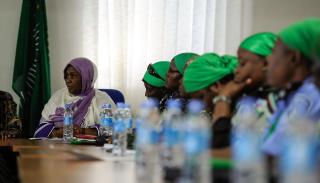
Breadcrumbs navigation
Pan-African gender governance: The politics of aspiration at the African Union
In this short summary video, author Karmen Tornius discusses the key points from her new Review of International Studies (RIS) article - Pan-African gender governance: The politics of aspiration at the African Union.
The African Union (AU) has developed an elaborate gender governance architecture, including gender machineries and women’s desks, policy frameworks, path-breaking women’s rights laws, and ongoing campaigns on women’s rights–related issues. At the same time, the member states’ engagement with this architecture is at best lukewarm, with a lack of domestication, compliance, and accountability.
Want to know more? You can read the full article at DOI: https://doi.org/10.1017/S0260210523000293
This particular article is open access, however BISA members receive access to all articles in RIS (and our other journal European Journal of International Security) as a benefit of membership. To gain access log in to your BISA account and scroll down to the 'Membership benefits' section. If you're not yet a member join today.
Full abstract
The African Union (AU) has developed an elaborate gender governance architecture, including gender machineries and women’s desks, policy frameworks, path-breaking women’s rights laws, and ongoing campaigns on women’s rights–related issues. At the same time, the member states’ engagement with this architecture is at best lukewarm, with a lack of domestication, compliance, and accountability. This paradox is addressed in this article by developing the theoretical thinking around aspirational politics (Martha Finnemore and Michelle Jurkovich, ‘The politics of aspiration’, International Studies Quarterly, 64:4 [2020], pp. 759–69) and political brokers (Stacie E. Goddard, ‘Brokering change: Networks and entrepreneurs in international politics’, International Theory, 1:2 [2009], pp. 249–81), showing the social and relational origins of pan-African gender governance. In doing so, the article examines how ‘aspirational politics’ can be operationalised to examine the sociocultural and political production of shared future imaginaries. The paper focuses on AU femocrats as the key actors for AU’s aspirational gender agenda and argues for their importance as political brokers between AU member states, donors, UN agencies, and civil society organisations. By mobilising actors and facilitating common ground and agreement, their institutionalised broker position allowed for various political entrepreneurs to emerge and thrive. At the same time, their pursuits are met with ‘aspirational fatigue’ or outright contestation by the member states. The case of the AU demonstrates how aspirational politics is not a ‘phase’ leading to norms governance but part and parcel of normative negotiation and engagement.
Image by AMISOM Public Information licensed under the CC0 1.0 Universal Public Domain Dedication.


